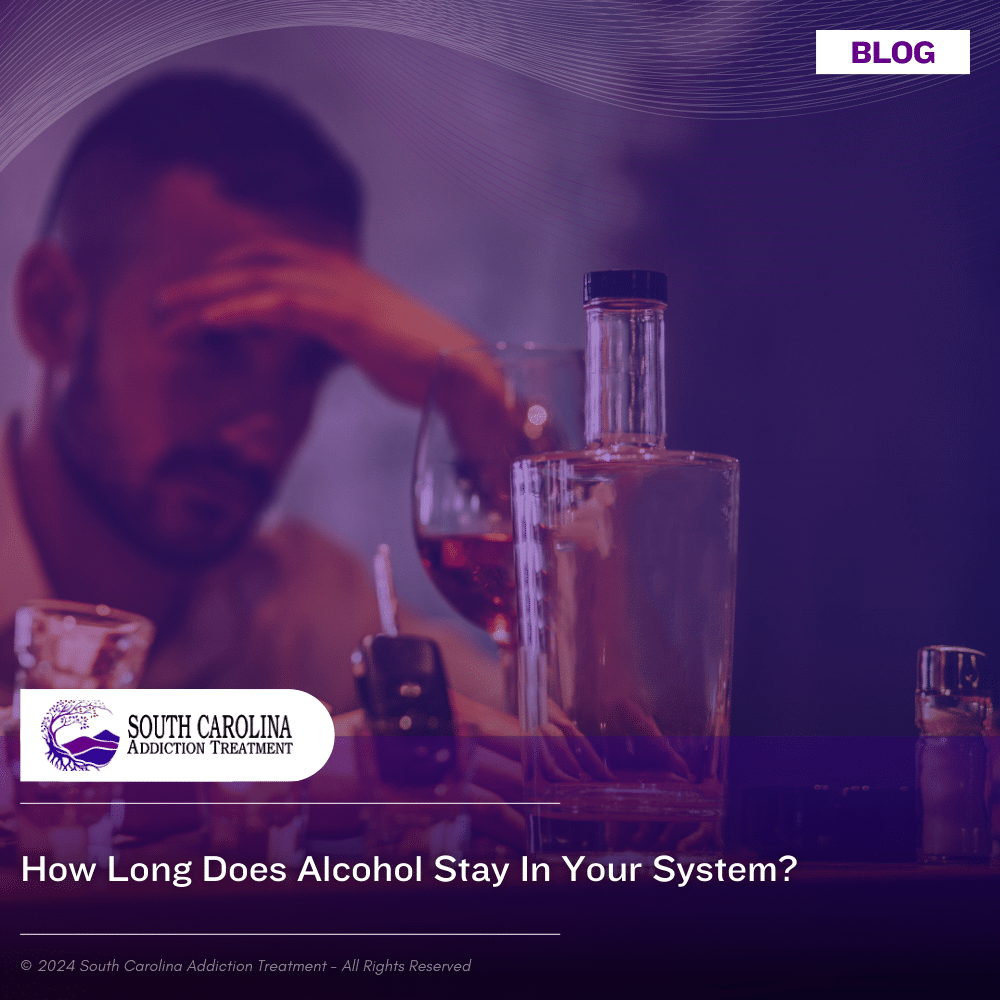How Long Does Alcohol Stay in Your System?

Medically Verified: 2/1/24
Medical Reviewer
Chief Editor

All of the information on this page has been reviewed and verified by a certified addiction professional.
After you drink alcohol, you may experience feelings of warmth and intoxication. But how long do these effects last and how long does alcohol stay in your system?
Most people process alcohol at a rate of about one standard drink per hour. One standard drink is equivalent to roughly 14 grams of pure alcohol or 12 ounces of regular beer, 5 ounces of wine, or 1.5 ounces of liquor.[1]
Factors such as age, body mass, amount of food eaten, and amount of alcohol consumed will impact how long it stays in your system. Contrary to popular belief, going to sleep or drinking water will not eliminate alcohol from your body faster. The only way for it to leave your system is to wait and let your body filter alcohol out.
How Long Do the Effects of Alcohol Last?
The effects of alcohol should kick in 15 to 45 minutes after you have a drink. The more you drink, the higher your blood alcohol content (BAC) will rise, and the more intoxicated you will feel. Most people start feeling intoxicated when their BAC reaches 0.05%, become significantly impaired at 0.07%, and exhibit identifiable signs of intoxication at 0.10%. A woman who drinks four standard drinks in one hour will reach a BAC of 0.10% and appear intoxicated.[2]
Signs of alcohol intoxication include:
- Slurred speech
- Increase talkativeness and socialization
- Impaired coordination
- Slow reaction times
- Difficulty concentrating
- Confusion
- Loss of balance
- Trouble remembering things
How long these effects last depend on how much you’ve drank, whether or not you have food in your stomach, and how high your tolerance is. You will start feeling back to normal when your BAC falls below 0.05%.
How is Alcohol Metabolized?
As alcohol passes through the digestive tract, a significant amount of alcohol is absorbed into the bloodstream through the stomach and small intestine. Alcohol is carried in the bloodstream to the brain and other organs.[3]
Most alcohol ends up in the liver where the majority of metabolism takes place. The liver can process one ounce of liquor (one standard drink) each hour. Drinking more than this causes alcohol to accumulate in the blood, leading to an increased BAC.
Between 90% and 98% of alcohol is metabolized in the liver and absorbed in the body. The remaining 2-10% is expelled from the body through sweat, urine, feces, and vomit.
Factors that Impact How Long Alcohol Stays in Your System
The liver metabolizes alcohol at a constant, steady rate, however, there are various factors that influence how quickly metabolism takes place. These factors include:
- Age and metabolism – The faster your metabolism, the faster alcohol will leave your system. Since older people typically have a slower metabolism, age can affect the rate at which alcohol is metabolized.
- Body composition – Your body mass index and composition are important factors. Fatty tissue cannot absorb alcohol as fast as muscle tissue can, so individuals with more body fat will have a higher BAC for a longer amount of time than someone with barely any body fat.
- Biological sex – Men and women metabolize alcohol differently. Women have a higher percentage of body fat than men, so they reach a higher BAC faster and take longer to metabolize it. Hormone levels can also affect how quickly alcohol stays in the body and how long its effects last.
- Food consumed – Eating a meal before, during, or after drinking can slow down the rate at which alcohol is absorbed. Drinking on an empty stomach means you’ll get drunk faster, but you’ll also feel the effects longer.
- Medications – Certain medications interact with alcohol and slow down or speed up your metabolism, affecting the rate at which alcohol leaves your body. Some of these medications include benzodiazepines like Xanax, ADHD stimulants like Adderall, cough medicines, and some diabetes medications.[4]
How Long is Alcohol Detected on Drug Tests?
The amount of time alcohol can be detected in your system depends on the type of screening test used. Each drug test type has a different detection window. Estimates are as follows.
Breathalyzer
Breathalyzer tests are the most commonly used to test for alcohol consumption. Results can tell people if you’re intoxicated and what your BAC is estimated to be. Alcohol can be detected by most breathalyzers for 12-24 hours after your last drink.
Blood
Blood tests are highly accurate but are typically only used in medical settings. Alcohol can be detected in your blood for up to 6 hours.
Saliva
Alcohol can be detected in your saliva for 12-24 hours after your last drink.
Urine
Urine tests look for ethanol metabolites. Most urine tests can detect alcohol for 12-24 hours after your last drink, but some more advanced urinalysis tests can detect alcohol for 72 hours or longer.
Hair
Alcohol and other drugs can be detected in your hair for up to 90 days (three months).
Find Help for Alcohol Abuse and Addiction
Drinking too much in one sitting will allow alcohol to increase your BAC to dangerous levels, resulting in accidents, poor decision-making, health problems, and more. Regularly drinking too much can lead to physical dependence or alcoholism.
If you or someone you love are struggling with alcohol abuse, getting help can change your life. At South Carolina Addiction Treatment, each client enrolled in our program will receive individual attention from a therapist and psychiatrist as well as gain exposure to a multitude of traditional and alternative therapies. After a short time, our alcohol rehab in South Carolina can help you get your life back.
Start your recovery by contacting us today. An admissions counselor is available now.
References:

